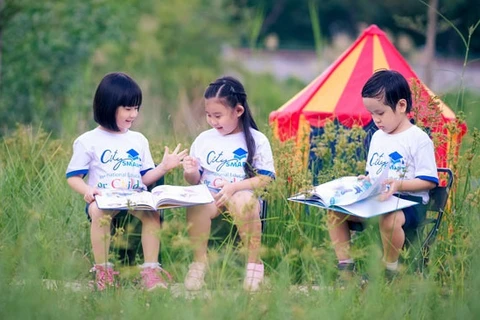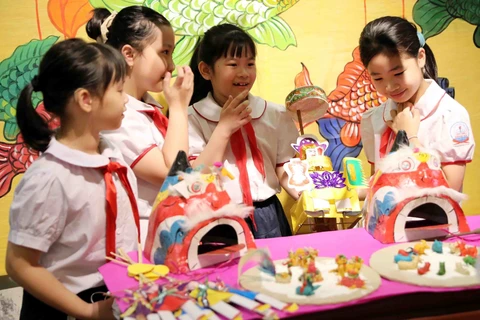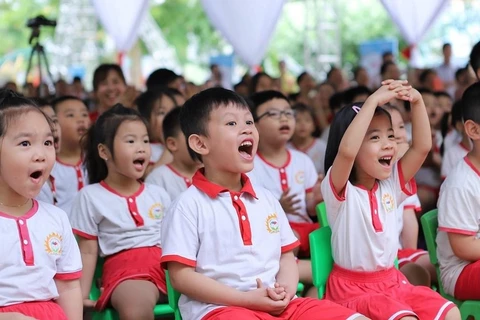 Delegates participate in the Children's National Assembly (NA) - a model of mock parliament. (Photo: VietnamPlus)
Delegates participate in the Children's National Assembly (NA) - a model of mock parliament. (Photo: VietnamPlus) Hanoi (VNA) - Since its first pilot in 2017, the model of Children's Council has been deployed in many provinces and centrally-run cities across the country, playing a significant role in promoting the rights and voices of the kids.
Affirming children's voices
Stepping into the National Assembly (NA) House in Hanoi for the first time as a deputy to the Children's NA - a model of mock parliament, Thanh Thao, a 9th grader from the Mong ethnic minority group in the northern mountainous province of Ha Giang, said she had never imagined doing this before.
Thao is also the vice chairperson of the Children's Council in Ha Giang’s Xin Man district. She is an ethnic minority student who lives in a mountainous area with difficult living conditions and limited resources compared to lowland regions. Thus, the model of Children's Council holds even greater significance. She said in her locality, most families lack knowledge and are influenced by long-standing prejudices and customs.
Joining the Children's NA, Thao hoped to raise such pressing issues as injuries, drowning, food poisoning, abuse and violence which affect many children in her locality and elsewhere.
Like Thao, Mai Nhi, a Tay ethnic minority student who is an 8th grader at Nguyen Trai secondary school in Viet Quang town, Bac Quang district, Ha Giang province, is devoting efforts with her role as a member of the provincial Children's Council.
Meeting with other children, Nhi said she heard stories of violence, abuse, and early marriages, which helped her understand more about the circumstances of her local peers. Nhi has turned these stories into reports submitted to the Ho Chi Minh Communist Youth Union of Ha Giang province.
Between 2017 and now, the model of Children's Council has continuously developed and earned many positive results, notably the successful organisation of the first Children's NA, which aimed to promote children's participation in tackling their own issues.
Participating in the council, children have the chance to delve deeper into the law on children, acquire knowledge about their rights and responsibilities, and hone their skills when performing their roles as representatives of the group. They are tasked with integrating with their peers at school and in their communities to gain insight into their thoughts and aspirations. The summary of what they have learned from such activities is the subject for their discussions with other council members, hence their submission of related proposals, suggestions, and recommendations to local leaders.
Opportunities for valuable knowledge, skills
Y Nguyen is a 9th grader at Hieu Semi-boarding Ethnic Secondary School in Kon Plong district in the Central Highlands province of Kon Tum. She said joining the Children's Council has provided her with valuable knowledge and skills.
 Y Nguyen said that she has matured step by step through her participation in the Children's Council. (Photo: VietnamPlus)
Y Nguyen said that she has matured step by step through her participation in the Children's Council. (Photo: VietnamPlus) The Mo Nam ethnic student, who is also Chairperson of the Kon Plong Children's Council, was born and raised in an area where 99.9% of the population belongs to ethnic minorities. Here people live with limited educational levels and many social prejudices, especially gender biases. She has been maintaining an active engagement in school activities, even though her school is more than 10km away from home.
With the knowledge and skills she has acquired, Y Nguyen discussed what gender equality and social prejudices mean with her friends, thereby raising awareness about children's rights in her school and local community.
The little girl from the Central Highlands dreams of becoming a capable child protection officer to help kids in her homeland and in other localities study and live in a safe and healthy environment./.


























